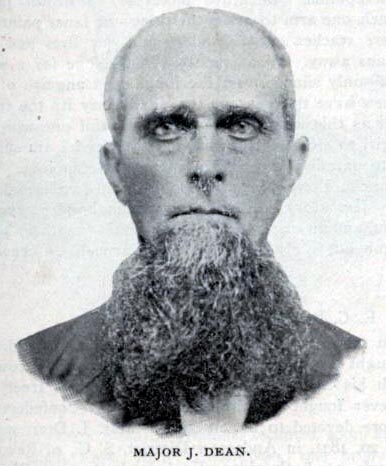![]()
Smith County, Texas
![]()
![]()
![]()
![]()

Confederate Veteran.
Vol. X No. 10
Nashville, TN Oct. 1902
Major J. Dean.
Rev. E. C. Rice writes from Tyler Tex.:
"You never had a truer friend than an old soldier who has fought his last battle, came off more than conqueror through his Savior, and is now at rest. No truer Southerner ever fought for the loved Southern Confederacy, nor one more devoted to her interest." Maj. J. Dean was born March 20, 1831, in Anderson District, S. C., of Revolutionary stock on both sides--English, Irish, and Welsh ancestry. He moved to Dallas, Tex., in the fall of 1853; the next year, to Smith County, Tex.
"In September, 1861, he was made lieutenant of Company F (Capt. William Smith), Seventh Texas Infantry, and was captured at Fort Donelson. Lieutenant Dean, being absent with a detail, escaped capture, and soon reported to General Beauregard for duty. He afterwards resigned, returned to Texas, and became a member of Company F (Capt. Jonathan Lewter), Fifteenth Texas Infantry, serving until the close of the war, as faithful and true as ever served in the ranks. Efforts to recount the experiences of this noble man are vain. He was an earnest Christian, a faithful follower of his Great Captain. His comrades all testify to his consistency as a soldier of the Cross. Soldiers in the Civil War know how much this means. [Of Company F, Seventh Texas Infantry, six survive. The list has been published in the VETERAN.] He was senior deacon in the Dean Baptist Church, Tyler, Smith County, Tex., gave the land and built the house--hence the name. He has three sons, preachers of the gospel. Major Dean had an autograph letter from President Jefferson Davis sssuring him of his sympathy, love, and fraternal devotion to the last, framed together with his furloughs, discharge, and other relics of his soldier life. He attended reunions, giving of time, money, and himself to all Confederate interests, and especially to the CONFEDERATE VETERAN. It is filed for several years and subscription paid to May 1903. Continue sending it. His children and grandchildren will read and ever prize it. He owned a fine farm and lovely home by the Cotton Belt railroad, and he supplied a water tank. September 12, 1902, the boiler exploded, discharging a cloud of steam, smoke and fire. Major Dean, a little grandson, and I were a few feet away. He was hurled to the earth and fatally scalded from head to feet. The little boy was not so seriously burned. I was present to attend our monthly meetings at Dean Church, some four hundred yards away. I am his nephew, and was a boy soldier two years, Company K, Thirty-Fith Volunteer Cavalry. As soon as possible I got my uncle to the house. Medical assistance and all that mortals could do were of no avail. He suffered agony, but was unconscious much of the time for twenty-seven hours, when he peacefully passed into rest. During this time he repeated Psalms, and from chapters of God's Word, and sang: "When I can read my title clear to mansions in the skies." He gave directions about his property and his loved ones; also as to his burial in the Dean churchyard.
"Sunday at 3:30 P.M., September 14, 1902, his body was carried to the church. Six Confederate veterans, with other assistants, acted as pallbearers. A multitude of friends and neighbors were present--more than filling the church. Services were conducted near the grave by the pastors of Dean, First Tyler, and Overton Baptist Churches, with several ministers present."
Information provided by:Ms. Bunny Freeman
![]()
![]()
![]()
![]()
![]()
![]()
![]()
![]()
![]()